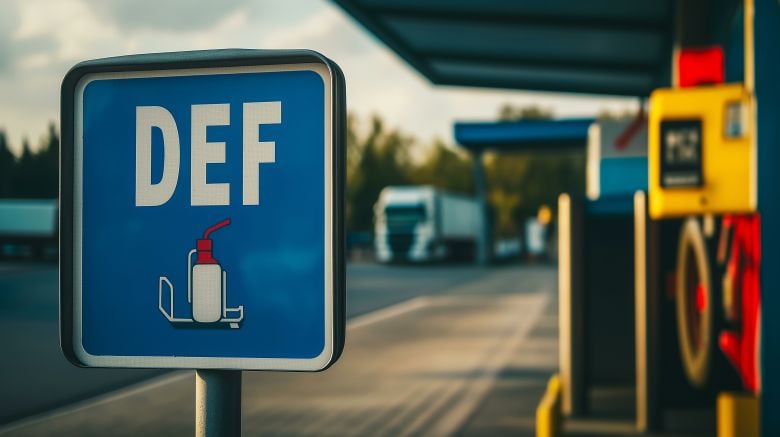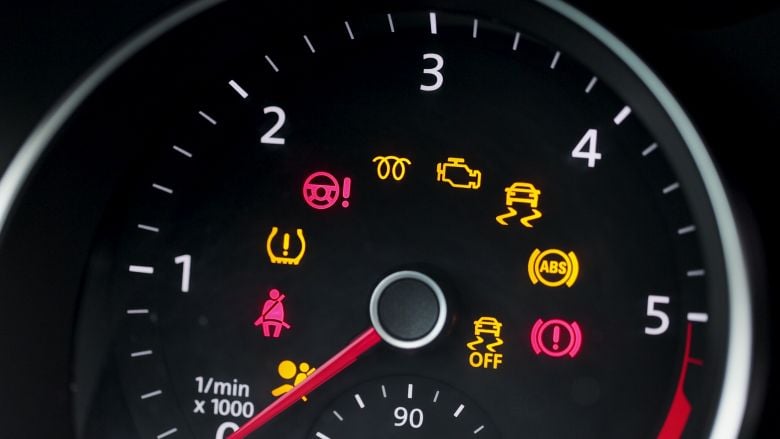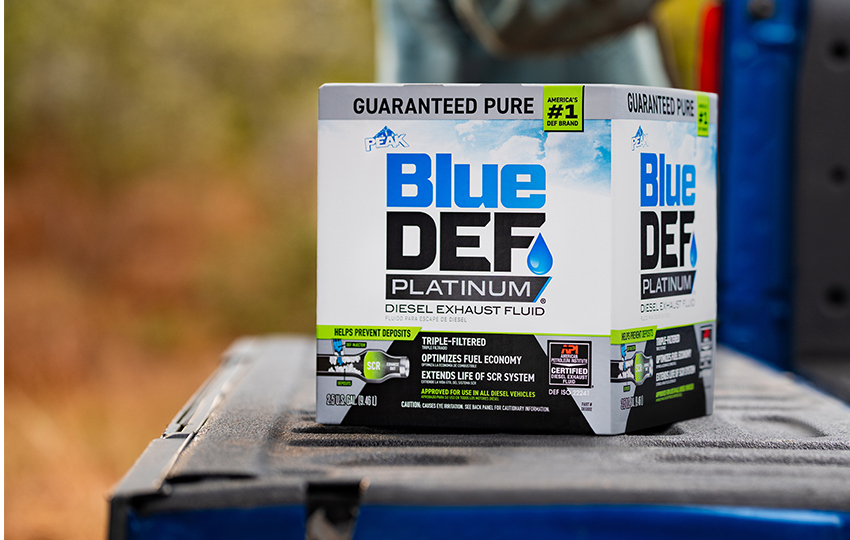
How to Prevent DEF Crystallization
- Vehicle Maintenance
- BlueDEF
- August 21, 2025
Follow this helpful advice on how to prevent DEF crystallization in your diesel vehicle.
Diesel exhaust fluid (DEF) is a liquid additive used to reduce harmful emissions from diesel-powered vehicles. It's made of 67.5% deionized water and 32.5% urea, which work together to neutralize the toxic nitrogen oxides (NOx) found in diesel exhaust.
DEF normally does a great job of eliminating NOx without affecting your vehicle's performance. However, DEF crystallization can occur if the urea components become too heavily concentrated. Multiple factors can cause this, and crystallization can lead to serious problems if you don't take action.
OWI product manager and DEF expert, Alex Vasic, joined us to talk about DEF crystallization and how to prevent it. Alex also shared some helpful advice on best practices to follow when using diesel exhaust fluid.


What is DEF crystallization?
Crystallization happens when the DEF's urea concentration becomes too high. This usually occurs when its water components evaporate, exposing the urea to air and causing crystals to form. "Ultimately, air is always the culprit for crystallization," Alex explains.
Some sources say that crystallization can also happen if you use DEF that was previously frozen. However, this shouldn't be an issue if the DEF was pure and uncontaminated both before and after freezing. "Freezing doesn't affect the dilution of DEF between urea and water," Alex says. "If DEF just freezes, it's back to normal once it thaws."
For more background information on DEF, consult our ultimate guide to diesel exhaust fluid.
DEF crystallization warning signs
How can you tell if you're having a crystallization issue? These warning signs can signal a problem:
Your engine derates, or goes into "limp mode"
Derating occurs when operating conditions within your engine trigger a programmed reaction that sharply reduces the engine's power output. This, in turn, can limit the engine damage caused by the underlying issue, whether it's DEF crystallization or something else.
"If you're talking about a pickup truck, you can go into 'limp mode'," Alex explains. "This reduces your speed to a maximum of about 5 miles per hour until you can resolve and repair the issue."
"Limp mode" usually follows something called "regen (regeneration) mode," which represents your vehicle's initial attempt to deal with a problem. "In regen mode, [your vehicle] tries to burn off whatever is stuck in the diesel particulate filter," Alex explains. "If that doesn't work, you can go into limp mode."


Warning lights and fault codes
When starting or driving your vehicle, you may see warning lights or fault codes that indicate a DEF crystallization problem. "[You'll usually see] error messages and error codes that [prompt you] to address the issue," Alex says. "[Your vehicle] won't just tap out suddenly while you're on the highway."
If your vehicle displays a warning signal or fault code you don't recognize, consult your owner's manual to find out what it means.
Performance losses and mechanical problems
If you start having frequent maintenance issues, detect unusual leaks or smells, or notice an overall loss of engine performance, DEF crystallization could be the cause, or a contributing factor.
"If your injector becomes crystallized, more DEF needs to be injected into the exhaust system," Alex says. "This means you're burning more DEF and using more fuel, so you'll also [notice that your vehicle] is wasting diesel."
What can happen to your vehicle if crystallization occurs?
Alex stressed that individual vehicles react differently to DEF crystallization, and that crystallization's consequences largely depend on how you use your vehicle. "[Crystallization impacts vary] on a case-by-case basis," he says.
In addition to engine derating, DEF crystallization can also lead to problems including:
- Clogged DEF lines and injectors
- Damage to DEF pumps, or pump failures
- SCR system malfunctions
- Potential damage to your vehicle's catalytic converter
Your driving habits can also affect the outcome. "People that do a lot of short trips can get more crystallization," Alex says. "It depends on the heat of the system. People that drive longer distances and keep their SCR systems at a higher temperature may burn the crystallization off."
Tips for preventing DEF crystallization
Alex identifies a few common situations that can lead to DEF crystallization. By avoiding these situations, you can stop your DEF from becoming crystallized.
Follow these tips:
Prevent contamination
DEF contaminates very easily. "If you leave a DEF jug somewhere, particles can get into the jug. These can potentially crystallize or damage your SCR (selective catalytic reduction) system," Alex says.
"[When pouring DEF], you also want to make sure to use proper nozzles that are clean and new," Alex continues. "If you use old ones, crystals can be stuck in the nozzle and those can contaminate your SCR system as well."
You should also:
- Avoid cross-contamination: use only designated DEF storage containers
- Keep your DEF away from other automotive fluids you store
- Discard expired DEF, and only use DEF that hasn't passed its best-before date
Finally, never mix DEF with fuel, other water sources, or any other substance. Mixing will cause serious contamination problems.
Store your DEF properly
"You want to store DEF between 12 degrees and 86 degrees Fahrenheit, and you want to keep it in a cool shaded area out of sunlight," Alex says. "Sunlight exposure can compromise the quality of DEF or damage it."
While exposure to lower or sub-freezing temperatures won't necessarily impact the chemical composition of your DEF, this is not true of excessive heat. At temperatures above the 86-degree mark, evaporation and chemical decomposition can occur. Your DEF can degrade and become more prone to crystallization.


Use high-quality DEF, only as directed
"Consumers should use high-quality DEF manufactured to ISO 22241 standards," Alex says. Otherwise, the DEF's purity cannot be guaranteed and you will expose yourself to potentially costly risks.
PEAK manufactures its signature DEF product lines to the highest standards. All BlueDEF and KleenDEF products fully comply with ISO 22241 requirements.
If you're unsure about dosing rates, consult your owner's manual or check online for original equipment manufacturer (OEM) recommendations. Using more DEF than you need can cause the fluid to pool up and crystallize.
Maintain your vehicle
Good vehicle maintenance habits can also prevent problems in your SCR system and DEF injector, tank, and lines. To this end, you should:
- Follow your vehicle manufacturer's recommended service schedule
- Clean or replace clogged filters
- Maintain a proper engine load
- Regularly inspect your sensors, injector, tanks, and lines for signs of excess wear
Following this advice can sharply reduce your risk of developing a crystallization problem.
What to do if you have a DEF crystallization issue
If you know or suspect that you have a problem with crystallized DEF, act immediately. "Take your vehicle in for professional service," Alex advises.
The solution to your issue could be simple or complicated, depending on its cause, but the only way to know for sure is to undergo professional diagnostics.
Use PEAK's premium DEF products, manufactured for quality and purity
PEAK's industry-leading DEF products have the quality and purity you need to beat crystallization. Our regular BlueDEF and KleenDEF formulations offer guaranteed purity that meets or exceeds OEM standards. You can also upgrade to premium BlueDEF Platinum, which has a proprietary additive blend that protects your SCR system and optimizes fuel economy.
Whichever you choose, your diesel vehicle will benefit from our signature PEAK performance!

